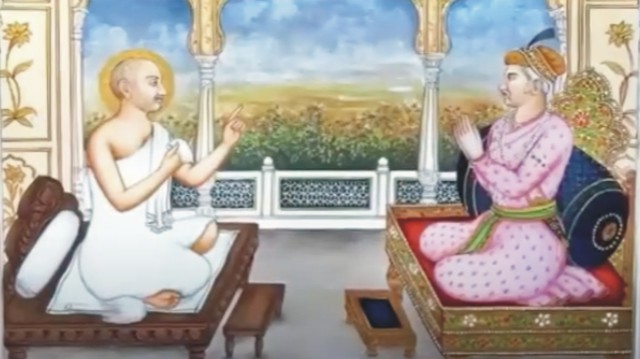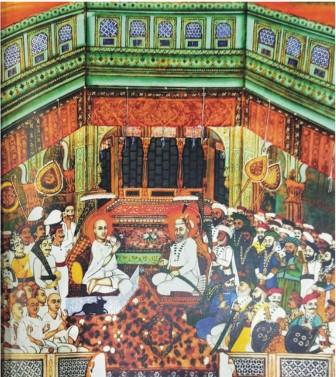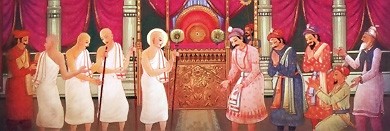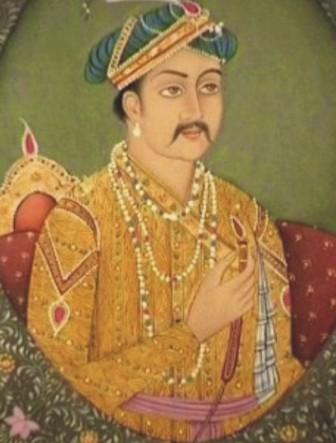

Akbar ‘s contact with Jains began as early as 1568, when Padma Sunder who belonged to the Nagpuri Tapagaccha was honoured by him.
As mentioned in the book `The Mughal Empire’ by the well known historian Dr Ishwari Prasad, the Jains had a great influence on the Emperor.

A debate was held in Emperor Akbar’s Court between the Jain monks Buddhisagar of Tapgaccha and Suddha Kirti of Khartargaccha on the subject of the Jain religious ceremony called Pansadha (probably Paryushan, which is the most important Jain function) in which the winner was given the title Jagatguru by Akbar.
Having heard of the virtues and learning of Hira Vijaya Suri, a great Jain saint who lived in Ahmedabad, the Emperor sent an invitation in 1582 to him through the Mughal Viceroy at Ahmedabad.
Suri accepted it in the interests of his religion. He was offered money by the Viceroy to defray the expenses of the journey but he refused.
The delegation consisting of Hira Vijaya Suri, Bhanu Chandra Upadhyaya and Vijaya Sen Suri started on their journey and walked on foot (begging alms on the way, as was their custom), to Fatehpur Sikri, and were received with great honour befitting imperial guests.
Hira Vijaya Suri had discussions with Abul Fazl. He propounded the doctrine of karma and an impersonal God.

When he was introduced to the Emperor he defended true religion, and told him that the foundation of faith should be daya (compassion) and that God is one though he is differently named by different faiths.
The Emperor received instruction in dharma from Suri, who explained the Jain doctrines to him. He discussed the existence of God and the qualities of a true Guru and recommended non-killing (Ahinsa).
The Emperor was persuaded to forbid the slaughter of animals for six months in Gujarat and to abolish the confiscation of the property of deceased persons, the Sujija Tax (Jeziya) and a Sulka (possibly a tax on pilgrims) and to free caged birds and prisoners.
The delegation stayed for four years at Akbar’ s court and left for Gujarat in 1586. Hira Vijaya Suri imparted a knowledge of Jainism to Akbar and obtained various concessions to his religion.

The Emperor is said to have taken a vow to refrain from hunting and expressed a desire to give up meat-eating forever as it had become repulsive to him.
Jainism, with its doctrine of non-violence, made a profound impression on the Emperor, and influenced his personal life. He curtailed his food and drink and ultimately abstained from flesh diet altogether for several months in the year.
He renounced hunting which was his favourite pastime, restricted the practice of fishing and released prisoners and caged birds. Slaughter of animals was prohibited on certain days and ultimately in 1587 for about half the days in the year.
When Suri and his associates were leaving for Ahmedabad, the Emperor presented Padma Sundar scriptures, which were preserved in his palace, to Suri.
Also Read: Anekantavad of Jainism
He offered them as a gift, and Suri was pressed by the Emperor to accept them. The delegation then departed on foot for Ahmedabad. ![]()
___________
Also Read:
TRUTH VS FALSEHOOD: BBC – Who is afraid?
Mughal Gardens – Name Changed, But Why?
Industrialization versus Environmental Degradation
Punjab – How a deadly cocktail of Agri-Water-Energy nexus going to destroy it?

Disclaimer : PunjabTodayTV.com and other platforms of the Punjab Today group strive to include views and opinions from across the entire spectrum, but by no means do we agree with everything we publish. Our efforts and editorial choices consistently underscore our authors’ right to the freedom of speech. However, it should be clear to all readers that individual authors are responsible for the information, ideas or opinions in their articles, and very often, these do not reflect the views of PunjabTodayTV.com or other platforms of the group. Punjab Today does not assume any responsibility or liability for the views of authors whose work appears here.
Punjab Today believes in serious, engaging, narrative journalism at a time when mainstream media houses seem to have given up on long-form writing and news television has blurred or altogether erased the lines between news and slapstick entertainment. We at Punjab Today believe that readers such as yourself appreciate cerebral journalism, and would like you to hold us against the best international industry standards. Brickbats are welcome even more than bouquets, though an occasional pat on the back is always encouraging. Good journalism can be a lifeline in these uncertain times worldwide. You can support us in myriad ways. To begin with, by spreading word about us and forwarding this reportage. Stay engaged.
— Team PT


Copyright © Punjab Today TV : All right Reserve 2016 - 2025 |